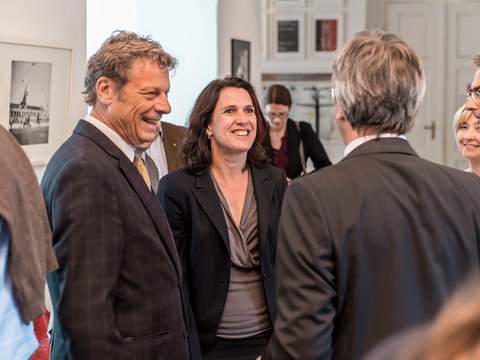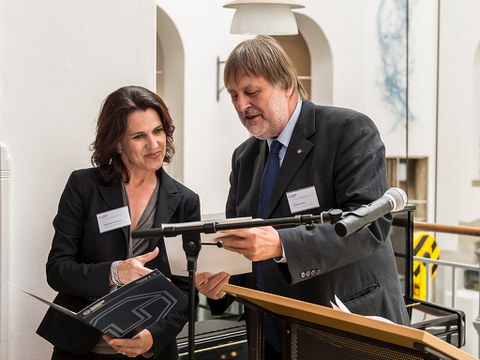Jul 23, 2014
Dresden Fellow: Science, Media and Society
Prof. Dominique Brossard visited TU Dresden from 1 June to 4 July, 2014. She was invited by Prof. Wolfgang Donsbach, head of the institute of media and communication within the Dresden Fellowship Programme. Dominique Brossard is Professor and Chair in the Department of Life Sciences Communication at the University of Wisconsin-Madison. Her teaching responsibilities include courses in strategic communication theory and research, with a focus on science and risk communication. She is an internationally known expert in public opinion dynamics related to controversial scientific issues. Prof. Brossard’s research program concentrates on the intersection between science, media and policy. She is particularly interested in understanding the role of values in shaping public attitudes and in cross-cultural analysis to understand these processes. We talked with her about her research and her experience in Dresden and at our university.
Welcome in Dresden and at the TU Dresden. Nice to meet you and thank you very much for the interview. How are you?
Very good. I’m fine.
It is not your first time in Dresden. Do you enjoy your stay in Dresden and what have you seen so far?
I enjoy my stay and I like the city very much. I did a little bit of everything: I went to a flea market, saw a lot of the sights and visited the “Bunte Republik Neustadt”. Dresden is such a great city and the people are very nice and friendly. I have been in Dresden a couple of years ago, but I stayed only for two days. To be able to stay for one month now, to be able to see not only the city but also look inside German university structures and being part of a department is amazing. I appreciate that I was given the opportunity to have this experience.
Prof. Donsbach invited you. How did you meet each other?
I met Prof. Donsbach when he was the president of the International Communication Association. This is one of the biggest communication organizations with more than 3.000 members. He also was the president of the World Association for Public Opinion Research (WAPOR). Both associations organize annual conferences and conferences are a great way to establish professional networks. Prof. Dietram Scheufele, who is the John E. Ross Professor in Science Communication in the Department of Life Sciences Communication at the University of Wisconsin, Madison, also knows Prof. Donsbach. Both are very interested in science communication. Prof. Scheufele also taught at TU Dresden and is an honorary professor here now. The three of us really want to establish research collaborations between our departments to conduct studies in science communication.
You said, you would be glad, if you could do a research project with the TU Dresden. Do you already know the topic of research?
Prof. Donsbach’s team and I exchanged ideas, discussed new methods and possible issues to investigate. That’s how it works. You try to see where you overlap, where the common interests are and what would be interesting to be pushed further. We have talked about applying for grants together to be able to do cross-cultural analyses. Topics of interests could be energy and sustainability and other scientific issues that are very politicized. As you know, Prof. Donsbach is a well-known expert in political communication. Obviously there are intersections that would be interesting to explore. We still need to sit down and decide what we want to do exactly. It would definitely be great to work on a project together and benefit from each other’s expertise.
You already gave a lecture to German students. What was your experience?
I taught a risk communication seminar with undergrads and master-students from the hard sciences and social sciences, with an emphasis on public perceptions: Why do we think flying a plane is scary but driving our car is not? What happens in people’s head? Furthermore we investigated the question: “How can you communicate about risk in the context of controversial science and technologies?”
The seminar consisted of three parts, which took place on 6, 20 and 27 June for three and a half hours, and 30 students participated. They were very attentive. It was very fruitful to have natural and social scientists in one room. They brought in different perspectives and raised issues they were all interested about. I was really happy to see that TU Dresden students and young scientists were willing to come and spend three hours with a professor from a very different field to talk about something new. I think that’s exciting. Undergrads in the social science found fascinating that my lectures used mainly examples from the science field, for example genetic engineering, climate change, or nanotechnology. That they were willing to discuss these issues is not that common and I am glad it happened because we want to build bridges between fields of study and increase interdisciplinarity.
I also really enjoyed interacting with the scientists at the Max Plank Institute of Molecular Biology, and the Boysen Research training group. Exchanges between the social sciences and the natural sciences is really what modern societies needs nowadays, and I am happy to be part of this movement.
Do you think the Dresden Fellow Program is a good invention?
I think it is a really good invention. You get to experience a lot more about the professional context of a research university when you have the opportunity to stay for a longer period of time. Whenever we do conferences and talks, we stay for two days and then we leave. We don’t understand the context and the reality of the other institution. For good collaborations to take place, it is really important to understand each other. And the program really helps, I think.
You are working on a very interdisciplinary field of research. You combine life science, natural science and social science. What is so fascinating about it?
I was originally trained in biology, plant genetics and plant biotechnology. After that, I worked for five years in management consulting for the firm Accenture. I got very interested in understanding why people were resistant to change and in the human dimension of different scientific issues. I understood the science but I really did not have much expertise in the social science. So I went back to Cornell University to get a PhD in science communication. And because my training was in genetic engineering I focused my dissertation research in understanding public opinion about genetic engineering.
As a scientist I have always been fascinated to see that people can be afraid of science in certain contexts and not others. I grew up in a lot of countries and realized very early on that different cultures approach science and technology very differently. Why is that and what are the mechanisms that make people react like that? My dual training as a natural scientist and a social scientist, as well as my international experience, is good combination for this field of research.
My strong view is that all students of in the natural and the hard sciences should take at least a class in “science, media and society.” We know a lot about communication: the process of framing, of priming, or sociological processes among other aspects. For instance, if you are a scientist and talk to a journalist, you need to know what you are doing because it can backfire. You need to be aware of the complexity at play.
More broadly, science, social sciences and the humanities have to work together for technologies to be integrated in societies with appropriate frameworks and while taking into account social, ethical and legal constraints. This is a realization that is quite recent to some extent. Scholars had been saying this for a quite long time but the realization at the political level or even at the university level has been much slower. We need to cross those boundaries.
Which advice would you give to future communication and science students and researchers?
I would strongly encourage them to take classes that are not just in their own field. The more you open your mind to understand the context in which science is produced, the more you will be a successful scientist.
Thank you very much for the interview.
The Interview was conducted by Jana Höhnisch in July 2014.


